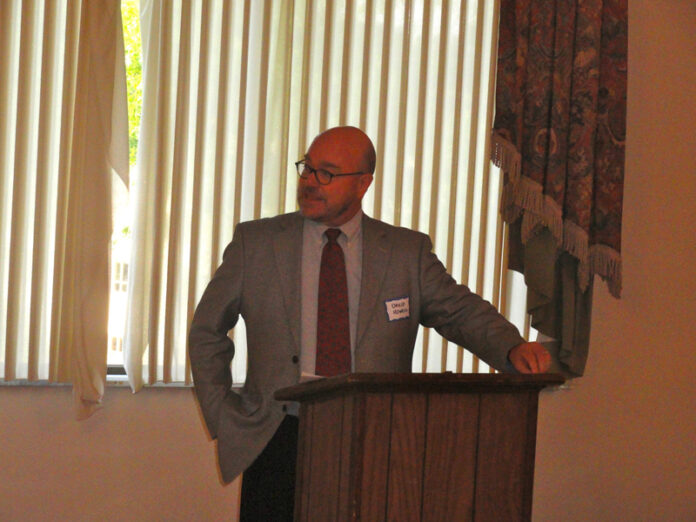
by Gene Marrano
Last Thursday’s National Day of Prayer, which included a noon-time gathering in downtown Roanoke, also featured the annual Interfaith Breakfast sponsored by the Roanoke Kiwanis Club. This gave attendees – worshippers and clergy from many faiths represented in the Roanoke Valley – a chance to hear prayers offered in both Hebrew and Arabic. Those who don’t following Jewish or Islamic traditions may have been hearing those languages for the first time, at least in prayer.
“We’ve had this event for many years,” said Kiwanis Club President Jim Arend. Nevertheless, Interfaith Breakfast Committee Chair Wendy Mellenthin called this year’s event “a new direction” for the club. The National Day of Prayer event has roots going back to 1775, according to Mellenthin, with the Founding Fathers recognizing that citizens had a right to worship or pray as they saw fit.
The Interfaith Breakfast was held at the Elks Club on Persinger Road, where presiding officer Bill Bestpitch (also a City Council member) offered a special prayer for “those who are in harm’s way,” at the start of the program, which included attendees broken up into small, mixed groups at tables and a guest speaker.
Dr. David Howell, a professor of religion at Ferrum College, asked a simple question, one that has been pondered for many years. “Why do we pray?” said Howell, who earned a PhD at Oxford and studied as well at Princeton and Yale. “When we pray, it does change us,” added Howell. “[It] opens us up…to the joys of the world.” He also noted the National Day of Prayer event, and how it linked people everywhere: “We are joined on this day with people from around the country.”
Howell quoted Holocaust survivor, Nobel laureate and famed Nazi hunter Elie Weisel, who once proclaimed, “We are gathered here as people with names, with stories, with history.” Howell challenged breakfast attendees to “have an openness to learn. Be a community of names, where we listen.” It’s fine to acknowledge the tradition of their own particular religion, but Howell also asked people to “receive the beauty of others.”
After Howell spoke, each group was encouraged to discuss a question posed to them on a sheet of paper left on the table. One group was asked how they practice their Christianity in everyday life. Katie Zawacki, who runs the interfaith group “Voices of the Valley” with her husband John, said it was all about “serving those who don’t have. That is the call as a Christian.”
The Zawackis, who have been active in promoting relief efforts in the Caribbean, have helped promote community service projects, universal worship services and other inter-religious affairs through Voices of the Valley. Also seated at the Zawacki’s table was Ubong Assam, a Nigerian native now studying nursing at Jefferson College. “We believe in service to humanity,” said Assam, who practices the B’hai faith, which she labeled as a blend of Christianity and Islam.
“For many, service is deeply ingrained,” said Howell, as he asked each table to report on their particular discussion. “It’s become a part of who we are.” So has the National Day of Prayer for some, and praying each day for many. The Kiwanis Club’s interfaith committee has also started a blog, where they hope to spur a lively conversation about faith, prayer, service to the community and other related matters. It can be found at bridgingbeliefsroanoke.wordpress.com.


